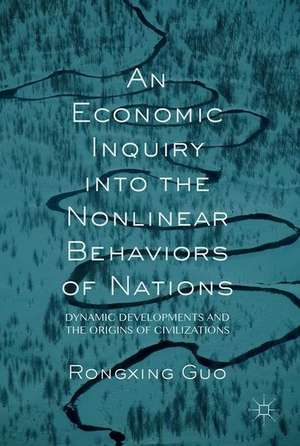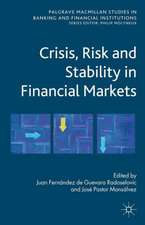An Economic Inquiry into the Nonlinear Behaviors of Nations: Dynamic Developments and the Origins of Civilizations
Autor Rongxing Guoen Limba Engleză Hardback – 16 feb 2017
| Toate formatele și edițiile | Preț | Express |
|---|---|---|
| Paperback (1) | 779.71 lei 43-57 zile | |
| Springer International Publishing – 14 iul 2018 | 779.71 lei 43-57 zile | |
| Hardback (1) | 784.92 lei 43-57 zile | |
| Springer International Publishing – 16 feb 2017 | 784.92 lei 43-57 zile |
Preț: 784.92 lei
Preț vechi: 957.22 lei
-18% Nou
Puncte Express: 1177
Preț estimativ în valută:
150.19€ • 157.24$ • 124.28£
150.19€ • 157.24$ • 124.28£
Carte tipărită la comandă
Livrare economică 07-21 aprilie
Preluare comenzi: 021 569.72.76
Specificații
ISBN-13: 9783319487717
ISBN-10: 331948771X
Pagini: 288
Ilustrații: XVII, 294 p. 18 illus., 16 illus. in color.
Dimensiuni: 148 x 210 x 19 mm
Greutate: 0.53 kg
Ediția:1st ed. 2017
Editura: Springer International Publishing
Colecția Palgrave Macmillan
Locul publicării:Cham, Switzerland
ISBN-10: 331948771X
Pagini: 288
Ilustrații: XVII, 294 p. 18 illus., 16 illus. in color.
Dimensiuni: 148 x 210 x 19 mm
Greutate: 0.53 kg
Ediția:1st ed. 2017
Editura: Springer International Publishing
Colecția Palgrave Macmillan
Locul publicării:Cham, Switzerland
Cuprins
1. Introduction
PART I: THE PARADOXES OF HUMANS, CIVILIZATIONS, AND NATIONS
2. Culture as an Anti-Darwinian Process
3. Good Environment, Bad Environment
4. Living in the Lands Threatened
5. Are there any Optimal Strategies for Nations?
PART II: CULTURAL CYCLICITY AND THE NONLINEAR BEHAVIORS OF NATIONS
6. Civilization as a Cyclical Human Process
7. China: Short Cycles, Long Cycles
8. The Western World: A Longer Cycle
9. In Cycles We Trust
Notă biografică
Rongxing Guo is Professor and Head of the Regional Economics Committee in the Regional Science Association of China at Peking University in Beijing, China. He has 30 years of experience teaching and researching in China, Australia, Japan, South Korea, Italy, Germany, and the USA. He has led research projects for the OECD and the World Bank, and has undertaken consultation for the Chinese government.
Textul de pe ultima copertă
This book applies an economic approach to examine the driving forces behind the dynamic behaviors of developing nations. Taking into account initial conditions and environmental and external factors often oversimplified by historians and anthropologists, Guo finds that the rise and fall of civilizations and nations followed an anti-Darwinian process: physical weakness, rather than strength, induced humans to adapt. Cultures facing unfavorable physical and environmental conditions developed complex societies to overcome these challenges, while favorable conditions did not incentivize major economic and cultural change. Over centuries of economic growth and development, nations and civilizations’ adaptive behaviors have followed a cyclical path at both the country level and in an international context. This interdisciplinary book incorporates elements of history, anthropology, and development into an astute economic analysis that changes the way we think about the origins and evolutions of civilizations.
Caracteristici
Provides in-depth studies of both ancient and modern civilizations
Introduces new data and explanatory variables to analysis of over 150 countries
Combines analytic, narrative, and narrative analytic approaches
Introduces new data and explanatory variables to analysis of over 150 countries
Combines analytic, narrative, and narrative analytic approaches











